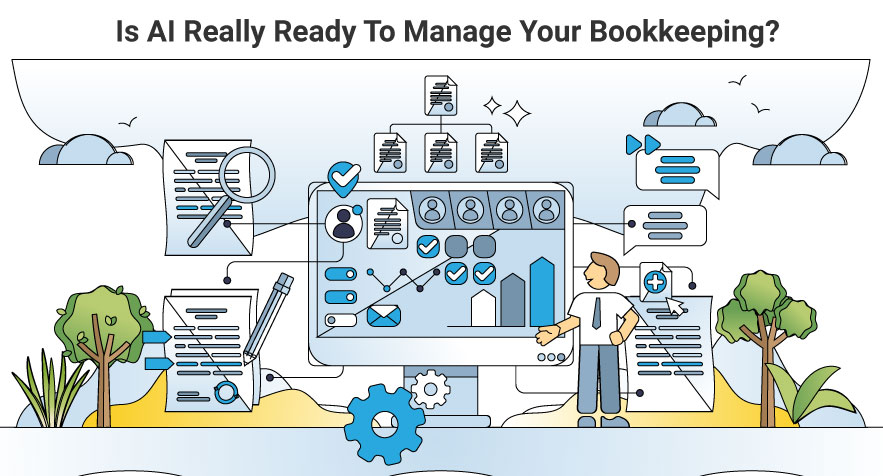Are AI Tools Ready for Bookkeeping? A Candid Conversation with The Tax Lawyer, William D. Hartsock, Esq.
In a world driven by technological advancements, the promise of AI revolutionizing the field of bookkeeping is tantalizing. However, after a thorough evaluation of six prominent AI bookkeeping tools, it becomes clear that the landscape is not as advanced as some might think. The Tax Lawyer, William D. Hartsock, Esq., lends his expert insights to shed light on the current state of AI tools for bookkeeping and separates fact from fiction.
The Reality Check: AI's Current Standing
According to Mr. Hartsock, the existing AI tools in the bookkeeping domain are currently mired in grand claims that fall far short of their promises. During a candid interview, he expressed his skepticism towards these tools. "Sales pitch lie, sales pitch lie, sales pitch lie," he declared emphatically. The prevailing sentiment is that current AI offerings are not yet capable of delivering on their touted benefits. Mr. Hartsock draws attention to the fact that AI's potential is undeniable, but its realization is still a few years away. He predicts that it could take approximately five to ten years before AI truly transforms the bookkeeping landscape. The fundamental challenge lies in converting raw data from bank statements, credit card statements, and brokerage statements into usable, categorized information.
OCR and the Challenge of Accurate Data Extraction
The heart of the problem is Optical Character Recognition (OCR), the technology that converts scanned documents into machine-readable text. While OCR can process documents, it's not yet equipped to handle the complexities of bookkeeping documents. There are significant obstacles, such as misinterpreting numbers that are close together (5 and 6), confusing numbers with letters (5 and S), and misidentifying punctuation (periods as commas).
For AI to truly transform bookkeeping, it needs to conquer these OCR challenges. The potential lies in automating the extraction of crucial data, such as transaction dates, payees, and amounts, directly from bank statements, credit card statements, and brokerage statements.
The Quest for Accurate Categorization
One of the key expectations from AI bookkeeping tools is their ability to automatically categorize transactions accurately. However, this too is a complex task. Differentiating between varied transactions, determining relevant categories, and maintaining consistency require a level of AI sophistication that is still in the works.
AI tools that claim to achieve categorization accurately are often found lacking. Some platforms offer the "bank fetch" feature, which automatically pulls electronic statements from banks. While this feature helps alleviate manual data entry, it doesn't necessarily solve the categorization challenge.
The Hopeful Horizon: Future AI Bookkeeping
Despite the current shortcomings, there's a glimmer of hope on the horizon. Mr. Hartsock predicts that within the next five years, AI will evolve to the point where it can handle the intricacies of varied bank statements. Banks have unique formats, and AI needs to be trained on each format to extract data correctly. A unified system that can handle diverse bank formats is the key to transforming bookkeeping. Mr. Hartsock also hints at the emergence of AI tools that aim to work closely with users in building out their features. These tools would guide users through the categorization process and learn from their inputs, enhancing accuracy over time.
The Road Ahead: An Honest Assessment of AI
As of now, the reality of AI tools for bookkeeping falls short of the visionary claims often made by companies in this space. The journey to transforming bookkeeping with AI is paved with challenges that need to be overcome, especially in the realms of OCR and accurate categorization. The Tax Lawyer, William D. Hartsock, Esq., concludes that while the present may not deliver on the hype, the future holds promise.
Conclusion: A Journey in Progress
The interview with The Tax Lawyer, William D. Hartsock, Esq., provides valuable insights into the current state of AI tools for bookkeeping. It's clear that while the potential for AI-driven bookkeeping is immense, the technology is still maturing. As businesses and individuals continue to seek streamlined financial management, the anticipation of AI's transformative impact remains high. Stay tuned for our next article, where we'll delve into the positive developments and potential future breakthroughs in AI-powered bookkeeping.
Stay Informed and Engaged
Interested in staying updated on the latest advancements in AI bookkeeping? Don't miss our upcoming article, where we'll explore the positive aspects and future possibilities of AI in the realm of financial management. To receive these updates directly in your inbox, subscribe to our newsletter today.



Comments (0)